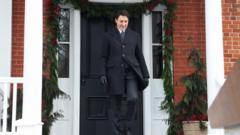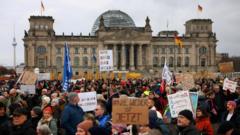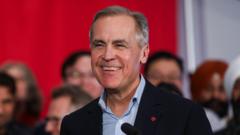After almost a decade in power, Trudeau acknowledges the need for change and a new Liberal Party direction.
The End of an Era: Trudeau Resigns as Prime Minister of Canada

The End of an Era: Trudeau Resigns as Prime Minister of Canada
The long-serving leader steps down amid mounting pressures and dwindling party support.
In a poignant announcement in front of Rideau Cottage, Prime Minister Justin Trudeau revealed his resignation after nearly nine years in office, citing the growing internal struggles within his party and a need for Canada to have a "real choice" in the upcoming elections. Trudeau's decision comes at a time when the Liberal Party is grappling with declining popularity, particularly as rival parties gain momentum.
Trudeau, who led the Liberals to a historic majority victory in 2015, has watched his image and support erode over time, reflecting a leader increasingly disconnected from public sentiment. As the last of a generation of global leaders who once stood alongside heavyweights like Barack Obama and Angela Merkel, his tenure has been marked by both commendable leadership on certain issues and significant controversies.
Political analyst Paul Wells highlighted that while Trudeau demonstrated real progress on indigenous reconciliation and climate policy, he struggled to stay attuned to shifting public priorities, particularly in the face of rising inflation and cost-of-living concerns, resulting in a lackluster political atmosphere. The discontent began to boil over, especially after a series of ethical missteps, including involvement in the SNC-Lavalin scandal and previous allegations regarding his choice of vacation destinations.
Public frustration escalated, especially after the Liberal Party's disappointing performance in recent special elections. Voter sentiment hardened amidst economic anxieties and perceived failures to deliver on key government promises, leading many members within the Liberals to publicly question Trudeau's leadership.
In his resignation speech, Trudeau expressed pride in his government’s achievements, such as steering Canada through the COVID-19 crisis and reinforcing social safety nets, but ultimately recognized the need for a shift. Following the resignation of key ally and former Finance Minister Chrystia Freeland, whose departure signified deepening fissures in party unity, Trudeau acknowledged that a reset was necessary for the health of Canadian politics.
As he prepares to step down, the question looms large: who will take the reins of the Liberal Party? With rising political tensions and an uncertain future, Trudeau’s resignation leaves a significant imprint on Canada’s evolving political landscape.
Trudeau, who led the Liberals to a historic majority victory in 2015, has watched his image and support erode over time, reflecting a leader increasingly disconnected from public sentiment. As the last of a generation of global leaders who once stood alongside heavyweights like Barack Obama and Angela Merkel, his tenure has been marked by both commendable leadership on certain issues and significant controversies.
Political analyst Paul Wells highlighted that while Trudeau demonstrated real progress on indigenous reconciliation and climate policy, he struggled to stay attuned to shifting public priorities, particularly in the face of rising inflation and cost-of-living concerns, resulting in a lackluster political atmosphere. The discontent began to boil over, especially after a series of ethical missteps, including involvement in the SNC-Lavalin scandal and previous allegations regarding his choice of vacation destinations.
Public frustration escalated, especially after the Liberal Party's disappointing performance in recent special elections. Voter sentiment hardened amidst economic anxieties and perceived failures to deliver on key government promises, leading many members within the Liberals to publicly question Trudeau's leadership.
In his resignation speech, Trudeau expressed pride in his government’s achievements, such as steering Canada through the COVID-19 crisis and reinforcing social safety nets, but ultimately recognized the need for a shift. Following the resignation of key ally and former Finance Minister Chrystia Freeland, whose departure signified deepening fissures in party unity, Trudeau acknowledged that a reset was necessary for the health of Canadian politics.
As he prepares to step down, the question looms large: who will take the reins of the Liberal Party? With rising political tensions and an uncertain future, Trudeau’s resignation leaves a significant imprint on Canada’s evolving political landscape.























